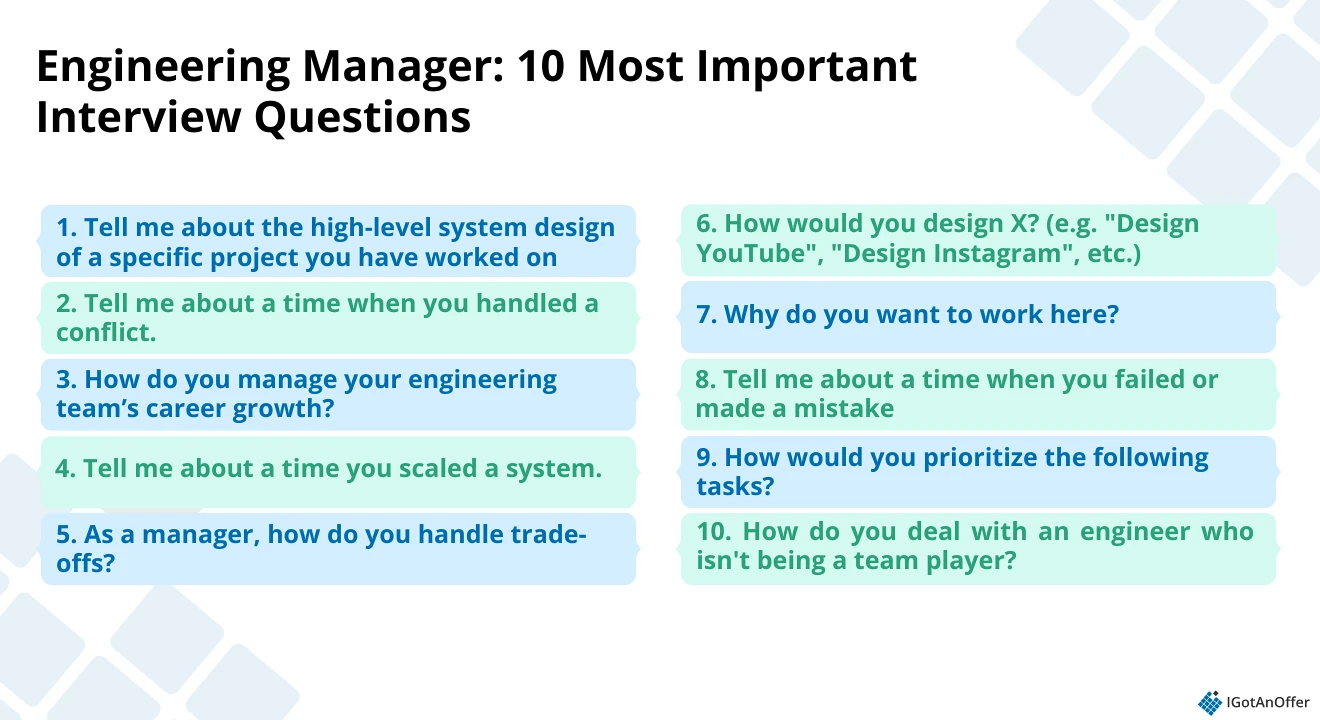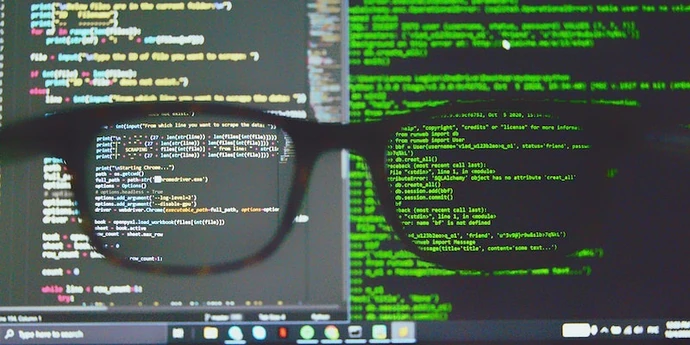Below are ten VERY important engineering manager interview questions. They have all been asked multiple times in recent interviews at top tech companies (Google, Meta, Amazon, Apple, Netflix, etc.)
If you're an EM candidate, you'll need to make sure you have a strong answer ready for these questions and ones like them (don't worry, this article will help you with that too).
If you're an interviewer, ask these questions to find the best hire for your engineering manager role.
Here's an overview of what you'll find: (thanks to Pranav, Engin, Mark, and Tom, ex-engineering managers and interviewers, for their insights).
- 10 most important engineering manager interview questions
- 50 engineering manager interview questions (categorized)
- Specific roles and companies
- Prep
Let's get into it!
Click here to practice mock interviews with top engineering manager interview coaches
1. The 10 most important engineering manager interview questions

These 10 questions are typically asked in interviews at FAANG companies and test for the main skills necessary to be a successful engineering manager.
We believe these are ten of the most important questions to ask, or know how to answer, in engineering manager interviews.
1. Tell me about the high-level system design of a specific project you have worked on
Engineering managers at top companies need to have a strong understanding of system design and experience in building scalable, complex systems.
Companies such as Meta ask this question instead of more traditional 'Design X" system design questions because it gets the candidate to talk about past experiences and thus is a more effective way to evaluate their expertise and way of working.
How to answer:
- Start by providing context about the problem you were solving and the goals of the project.
- Outline the key components of the system and how they interacted to achieve the desired functionality.
- Explain why you made certain design choices and what the trade-offs were.
- Talk about how you collaborated with members of your team or cross-functionally.
- Talk about the challenges you faced and be open about any failures.
- Talk about what you learned and how you will apply that to future projects.
If you're an interviewer, assess the candidate on:
- How well they articulate the problem they were solving
- Understanding of key system design principles
- Ability to communicate technical concepts clearly
- Evidence of good collaboration skills
2. Tell me about a time when you've handled a conflict
This question made up 9% of the reported engineering manager interview questions that we studied.
People management is a crucial part of an engineering manager's role and, as Pranav (ex-Meta EM) explained to us, an ability to resolve conflict with their peers, managers, or external teams is a key trait that interviewers look for in EM candidates.
How to answer:
- Use the SPSIL framework (Situation, Problem, Solution, Impact, Lesson) to structure your answer.
- Try and use an example with a positive outcome/
- Demonstrate empathy.
- Demonstrate leadership skills by using a group conflict situation.
- Avoid speaking too negatively about anyone.
To deep-dive into this question, see 5 ways to answer "Tell me about a time you had a conflict".
If you're the interviewer, assess the candidate on:
- Their ability to navigate interpersonal conflicts professionally and constructively
- How they identify the root cause of the conflict and develop a resolution strategy
- Evidence of empathy and active listening skills in conflict resolution scenarios
- Their approach to fostering a positive team dynamic and preventing future conflicts
- Adaptability in handling conflicts with different team members and in various contexts
3. How do you manage your engineering team’s career growth?
Engineering managers need to implement strategies that help the engineers in their team develop and grow.
Some specific strategies and relevant topics might be: individual development plans, ongoing feedback and performance discussions, recognition and rewards, promoting internal mobility, fostering a culture of innovation and constant development, and supporting work-life balance.
How to answer:
- Discuss your approach to creating individual development plans for team members based on their goals and aspirations.
- Explain how you provide ongoing feedback and conduct performance discussions to support career growth.
- Share examples of how you recognize and reward team members for their achievements and contributions.
- Talk about your efforts to promote internal mobility and create opportunities for career advancement within the team.
- Highlight initiatives aimed at fostering a culture of innovation and continuous development among team members.
- Discuss strategies for supporting work-life balance and employee well-being within the team.
Click here to learn how to answer people management questions.
4. Tell me about a time you scaled a system
Engineering managers at top tech companies need to create products that can be used by billions of users. But it's not just at big companies that scaling systems is important. Even a small start-up in a hurry to create an MVP will want to scale it sooner or later.
Interviewers ask this question to assess if the candidate knows how to make systems that will work reliably on a vast scale, maintaining performance under heavy loads and being as cost-efficient as possible.
How to answer:
- Provide context about the system you scaled, including its initial architecture and usage patterns.
- Describe the challenges you faced as the system grew and the need for scalability arose.
- Explain the scalability bottlenecks you identified and the strategies you employed to address them.
- Discuss the architectural changes or technologies you implemented to improve scalability.
- Try to quantify the impact of your scalability efforts in terms of performance improvements or cost savings.
- Reflect on what you learned and how you might approach scaling future systems differently.
If you're the interviewer, assess the candidate on:
- Their understanding of scalability principles and techniques
- Ability to identify scalability bottlenecks and propose solutions
- Experience in implementing scalable architectures and technologies
- Evidence of considering performance, reliability, and cost-efficiency in scaling decisions
- Collaboration skills in coordinating efforts across teams to achieve scalability goals
5. As a manager, how do you handle trade-offs?
Handling trade-offs is a crucial part of an engineering manager's job. In fact, it's a pretty much constant part of the job: Short-term gain vs long-term benefit? Make it simple or make it scalable?
Pranav (ex-Meta EM) told us that interviewers want to see a candidate who is confident in dealing with ambiguity and making difficult decisions in a logical and structured way.
How to answer:
- Emphasize decision-making based on data, stakeholder input, and strategic objectives.
- Explain the rationale behind your choices.
- Explain how you communicated trade-offs to the team and stakeholders.
- Reflect on lessons learned and continuous improvement in decision-making.
Click here to learn more about how to answer tech project/program management questions.
If you're an interviewer, assess the candidate on:
- How methodical/structured their approach is
- Look for examples demonstrating tough decision-making skills.
- Confidence dealing with ambiguity
- Assess their understanding of the business impact of different choices.
- Determine their ability to align decisions with overall company goals.
6. How would you design X? (e.g. "Design YouTube", "Design Instagram", etc.)
System design questions like this one made up over 15% of the interview questions that we collected from Google, Meta, Amazon, and Microsoft. These problems are great for testing engineering managers' understanding of system design and their approach to problem-solving under pressure.
However, candidates who answer these questions at FAANG companies have usually prepared for weeks or months. System design questions shouldn't be sprung on the candidate as a surprise, as even a great candidate will struggle to tackle this kind of problem if they're not ready for it.
How to answer:
- Ask clarifying questions: make sure you clearly understand the goals and requirements of the system.
- Design high-level, then drill down: quickly clarify the requirements and draft a high-level design for the system within the first 20 minutes. Then spend most of the remaining time drilling down into more detailed aspects of the system.
- Bring it all together: take a few minutes to summarize your solution and highlight important bottlenecks or improvement opportunities.
Click here to learn how to answer system design questions
If you're an interviewer, assess the candidate on:
- Their understanding of fundamental system design principles
- Ability to decompose complex problems and design scalable architectures
- Experience in making design decisions based on trade-offs
- Approach to handling constraints such as scalability, availability, and latency
- Communication skills in articulating their design choices and reasoning
- Adaptability in incorporating feedback and iterating on their designs
7. Why do you want to work here?
This question gets asked at almost all engineering manager interviews. It tests whether the candidate is genuinely excited by the company's mission and also tests whether they've done enough research and preparation ahead of the interview.
How to answer:- This question is almost guaranteed, so script a well-structured answer ahead of the interview.
- Whether it's a top company or a start-up, do your research.
- Be honest but avoid talking about money.
- Demonstrate enthusiasm for the work you'd be doing.
- Align your answer with the company's values.
- Talk about your career goals and why they fit with this opportunity.
Check out our article on How to answer the "Why Google?" questions. The advice is relevant no matter which company you're interviewing at.
8. Tell me about a time when you failed or made a mistake
Tech companies like Google, Meta, and Amazon ask this question because they're looking for engineering managers who aren't afraid of failure and are constantly learning.
Owning up to mistakes and learning from them are valuable traits for any hire. This is a great question to test for them.
How to answer:
- Use the SPSIL framework (Situation, Problem, Solution, Impact, Lessons).
- Talk about a real failure that mattered.
- A mistake is not the same as a failure.
- Show that you're someone who takes responsibility and stays positive.
- Talk about how the failure made you better at your job.
For more tips on how to answer this question, plus five different example answers, see 5 ways to answer "Tell me about a time you failed".
If you're an interviewer, assess the candidate on:
- Their willingness to take ownership of their mistakes and failures
- Ability to reflect on the lessons learned from the experience
- Approach to addressing the consequences of their mistake and mitigating its impact
- Evidence of resilience and adaptability in bouncing back from failure
9. How would you prioritize the following tasks?
Prioritizing tasks is a key part of an engineering manager's day-to-day. This question is a good way of seeing how the candidate goes about such a crucial part of their job. The interviewer may list some example tasks and ask the candidate to order them in terms of priority and explain their reasoning.
How to answer:
- Begin by evaluating the urgency and importance of each task.
- Consider the impact of each task on the team's goals and objectives.
- Take into account any dependencies between tasks and their potential impact on other workstreams.
- Assess the resources required for each task, including time, manpower, and budget.
- Prioritize tasks that align closely with the team's strategic priorities and overarching objectives.
- Justify your prioritization decisions with clear reasoning and rationale.
- Remain flexible and open to adjusting priorities based on changing circumstances or new information.
If you're the interviewer, assess the candidate on:
- Their systematic approach to prioritization, considering factors such as urgency, impact, dependencies, and alignment with strategic objectives
- How well they communicate their reasoning
- Flexibility and adaptability in adjusting priorities based on changing circumstances or new information
- Approach to balancing short-term needs with long-term goals in task prioritization
10. How do you deal with an engineer who isn't being a team player?
This is another common people management question that we've seen come up many times in interviews for companies such as Google and Meta. Occasionally, it takes the form "How would you deal with too much competitiveness within your team?"
It's a good question for testing whether the candidate is empathetic and capable of understanding different people's different perspectives and ways of working, but that they can also set clear expectations, give honest feedback, and hold people accountable.
How to answer:
- If possible, talk about a past experience and use the SPSIL framework to structure your answer.
- Show that your first step would be trying to understand the reasons driving the behavior.
- Explain how you would offer support and guidance to help the engineer understand the importance of collaboration and how their actions affect team dynamics.
- Mention strategies such as team-building activities, clear communication channels, and regular feedback sessions to promote teamwork.
- Describe how you would monitor the engineer's progress.
- Demonstrate that you'd be prepared to escalate the issue and fire the engineer if necessary for the good of the team.
If you're the interviewer, assess the candidate on:
- Their approach to addressing issues of teamwork and collaboration within their team
- Ability to identify the root cause of the engineer's behavior and address it effectively
- Strategies for fostering a collaborative team culture and promoting teamwork
- Evidence of providing constructive feedback and coaching to the engineer
- Approach to handling conflicts or tensions within the team
- Reflection on how they balance individual performance with team dynamics
2. 50+ engineering manager interview questions (categorized)
Now that we’ve seen the 10 most important questions asked in engineering manager interviews, let's look at a more comprehensive list of questions.
We've put the questions that engineering managers face across the top companies into three categories: leadership (including questions on people and project management, and cultural fit), system design, and coding.
In the next sections, you’ll find an overview of each question type and lists of example questions from real EM candidates on Glassdoor.
2.1 Leadership questions
Engineering managers need excellent soft skills to coordinate teams and lead projects. They can achieve much more by leveraging strong leadership skills than they can do alone, no matter how good their technical skills are.
To test for leadership skills, top tech companies ask a mix of behavioral questions ("Tell me about a time" prompts that require the candidate to describe past experiences) and hypothetical questions.
The questions broadly fit into these three sub-categories:
- Culture fit and motivation questions to test whether the candidate's motivations and traits align with the company's way of doing things.
- People management questions to explore how the candidate would lead their team.
- Project management questions to explore how the candidate would deal with complex and ambiguous situations in order to deliver results.
Let’s take a look at some example questions.
Example behavioral questions asked in engineering manager interviews
Culture fit and motivation
- Tell me about yourself (Video tips)
- Why are you leaving your current job?
- Why /Google/Amazon/Facebook etc?
- Tell me about a mistake you made and the lesson you learned from it.
- Describe a time when a customer asked you for one thing, but you knew that they needed something else.
- When was the last time you did something innovative?
- How do you deal with low performers?
- How do you handle conflicts?
- How do you deal with high performers?
- Tell me about a time you developed and retained team members.
- How do you manage your team’s career growth?
- How would you grow a team x 10?
- Tell me about a difficult employee situation that you handled well/not so well.
- What would you do with someone that had stayed at the same level for too long?
- How do you recruit good engineers?
- Give an example of how you helped another employee.
- Tell me about a time you had a conflict with your supervisor and how you resolved it.
- Tell me about what you've been working on over the last year.
- As a manager, how do you handle trade-offs?
- Describe how you deal with change management.
- Describe in detail a project that failed.
- Describe a project in the past that was behind schedule and provide concrete steps that you took to remedy the situation.
- Tell me how you would balance engineering limitations with customer requirements.
- What was the largest project you've executed?
- Tell me about a time you needed to deliver a project on a deadline but there were multiple roadblocks and constraints to deliver. How did you manage that situation?
- Tell me about a project, product, or system you worked on. What were the design and technical problems you faced? How did you solve them?
- Tell me about the most technically complex project you've managed. How did you resource your team?
For candidates preparing for this part of the interview, we recommend the following three guides to learn how to ace these types of questions.
- How to answer behavioral questions (the guide is targeted for Google candidates but relevant for everyone)
- Grokking the engineering management leadership interview (written by coach Mark, highly insightful deep-dive into answering leadership questions)
- People management questions in tech interviews
- Program/project management questions in tech interviews
We also recommend the Practically leading engineering management page as a great resource if you want to read up on what various great minds say about management and leadership ahead of your interview.
Let’s move on to the other type of question common in engineering manager interviews.
2.2 System design questions
Companies such as Google, Amazon, and Meta build products that have millions of monthly active users. Their engineering managers therefore need to be able to design systems that are highly scalable.
There are two types of system design questions in engineering manager interviews.
The first is "Design X" type questions when the candidate is asked to design a system there and then, in the ~45mins or so allocated (popular at most FAANG companies).
The second is when the candidate is asked detailed questions about system design work they've done in the past (popular at all types of companies)
Let's take a look at some examples.
Example system design questions asked in engineering manager interviews
"Design X" type questions:
- Design a file-sharing system. (video solution)
- Design the next Twitter. (Written solution)
- Design WhatsApp. (Written solution)
- Design TikTok. (Video solution)
- How would you design a system that reads book reviews from other sources and displays them on your online bookstore?
- How do you handle calls between clients and REST API services with increased volumes?
- Design a short URL system (Written solution)
- How would you use a load balancer for memcache servers?
- How would you design Google Docs? (Written solution)
- How would you design a ticketing platform?
- Design an in-memory cache for webpages.
- Design a boggle solver.
- Design a distributed ID generation system.
- How would you design Google's database for web indexing?
- How would you design a webpage that can show the status of 10M+ users including: name, photo, badge and points?
- How would you design a system that counts the number of clicks on YouTube videos?
Past project system design questions:
- Describe a system/product/app you or your team built.
- Tell me in detail about the architecture of a project you've been involved with.
- How did you evaluate the design of your system?
- How did you test performance and scalability?
- Describe the bottleneck of the system you designed.
Candidates who want to go deeper into how to ace this part of their engineering manager interview should read our in-depth guide on how to answer system design questions.
We recommend watching the video below, where an ex-Google engineering manager explains the main principles behind system design interviews.
There remains one other question type that some engineering managers face. Let's move on to it now.
2.3 Coding questions
Most big tech companies don't ask coding questions in engineering manager interviews. That's because EMs aren't going to be spending their time coding.
Google does though, so if you're a candidate targeting Google you'll need to be ready for some Leetcode medium-level questions.
And some companies give EM candidates a coding review test to make sure their knowledge of best coding practices is still sharp even if their coding speed might have slowed.
Let's see some example questions asked at Google. We've included some questions from Google software engineer interviews, as they're similar to what an EM could expect.
Example coding questions asked at Google.
- Given the head of a linked list, return the list after sorting it in ascending order
- "Given a binary tree, find the maximum path sum. The path may start and end at any node in the tree." (Solution)
- "Given an encoded string, return its decoded string." (Solution)
- Implement a SnapshotArray that supports pre-defined interfaces (note: see link for more details). (Solution)
- "In a row of dominoes,
A[i]andB[i]represent the top and bottom halves of thei-th domino. (A domino is a tile with two numbers from 1 to 6 - one on each half of the tile.) We may rotate thei-th domino, so thatA[i]andB[i]swap values. Return the minimum number of rotations so that all the values inAare the same, or all the values inBare the same. If it cannot be done, return-1." (Solution)
If you're expecting a coding round in your engineering manager interview, we recommend reading our different coding interview guides as a launchpad for your preparation:
3. Specific roles and companies
3.1 Specific roles
Let's take a look at some questions more weighted to a particular type of engineering manager. These questions have been reported on Glassdoor.com by real candidates across a range of companies.
3.1.1 Data engineering manager interview questions
As you can see below, interview questions for data engineering managers will include types of questions not covered above, for example, SQL questions and technical questions about data systems.
Data engineering manager interview question examples
Coding:
- Write a Python program to remove duplicates, keep the first occurrence
- Write a Python program to count words
- Write a query that retrieves the maximum number of days that the application was installed in a row.
SQL:
- On the product-sales-customers data model that is preloaded in coderpad.io, write the following queries: 1. Count of stores in OR state with area_sqft > 25000 2. avg number of Female Customers group by state 3. Customer FirstName, Last Name and count of unique products purchased by state follow-up question - Return the top customer by state based on diverse product purchased (diverse = count(distinct product_id))
Technical knowledge/explanation:
- What is Spark context and how do we use it?
- How would you optimize the data pipeline using Spark data frame and config parameters?
- What is broadcast, and when should we use it?
- What is a data lake?
- What are the benefits of containers?
- Explain the data lake architecture for processing both transaction data and real-time data.
Past experience:
- Tell me about the data warehouse you worked with.
- Tell me about your experiences driving strategy in the data space.
- Provide an example where you had to deal with multiple data sources.
- Describe a data system you delivered and the impact on the business.
3.1.2 Group engineering manager interview questions
Group engineering manager interviews usually contain the same kind of questions as we've gone through above.
3.1.3 Director of engineering interview questions
Director of engineering interviews usually contain the same categories of questions as we've gone through above though the bar will be higher. Depending on the company, there could be some other types of questions similar to the examples below.
Director of engineering interview question examples
- Business case: explain your approach to grow rapidly the development teams by hiring external people via an agency.
- Explain CAP theorem.
- How do you create and sustain company culture in a remote environment?
- Design thread synchronization function to access common resources.
3.2 Specific companies
Of course, the exact type of questions you can expect in engineering manager interviews will vary a little depending on which company you're interviewing at. If you're interviewing at any of the companies below, our guides will cover everything you need to know.
- Meta engineering manager interview guide
- Google engineering manager interview guide
- Apple engineering manager interview guide
- Amazon SDM interview guide
- Netflix engineering manager interview guide
- Microsoft engineering manager interview guide
- Uber engineering manager interview guide
- DoorDash engineering manager interview guide
4. How to prepare for engineering manager interviews
We've coached more than 15,000 people for interviews since 2018. There are essentially three activities you can do to practice for interviews. Here’s what we've learned about each of them.
4.1 Learn by yourself
Learning by yourself is an essential first step. We recommend you make full use of the free prep resources on this blog (including our main engineering manager interview prep guide and also watch some mock interviews on our engineering channel. That way, you can see what an excellent answer looks like.
Once you’re in command of the subject matter, you’ll want to practice answering questions. But by yourself, you can’t simulate thinking on your feet or the pressure of performing in front of a stranger. Plus, there are no unexpected follow-up questions and no feedback.
That’s why many candidates try to practice with friends or peers.
4.2 Practice with peers
If you have friends or peers who can do mock interviews with you, that's an option worth trying. It’s free, but be warned, you may come up against the following problems:
- It’s hard to know if the feedback you get is accurate
- They’re unlikely to have insider knowledge of interviews at your target company
- On peer platforms, people often waste your time by not showing up
For those reasons, many candidates skip peer mock interviews and go straight to mock interviews with an expert.
4.3 Practice with experienced engineering manager interviewers
In our experience, practicing real interviews with experts who can give you company-specific feedback makes a huge difference.
Find an engineering manager interview coach so you can:
- Test yourself under real interview conditions
- Get accurate feedback from a real expert
- Build your confidence
- Get company-specific insights
- Learn how to tell the right stories, better.
- Save time by focusing your preparation
Landing a job at a big tech company often results in a $50,000 per year or more increase in total compensation. In our experience, three or four coaching sessions worth ~$500 make a significant difference in your ability to land the job. That’s an ROI of 100x!















